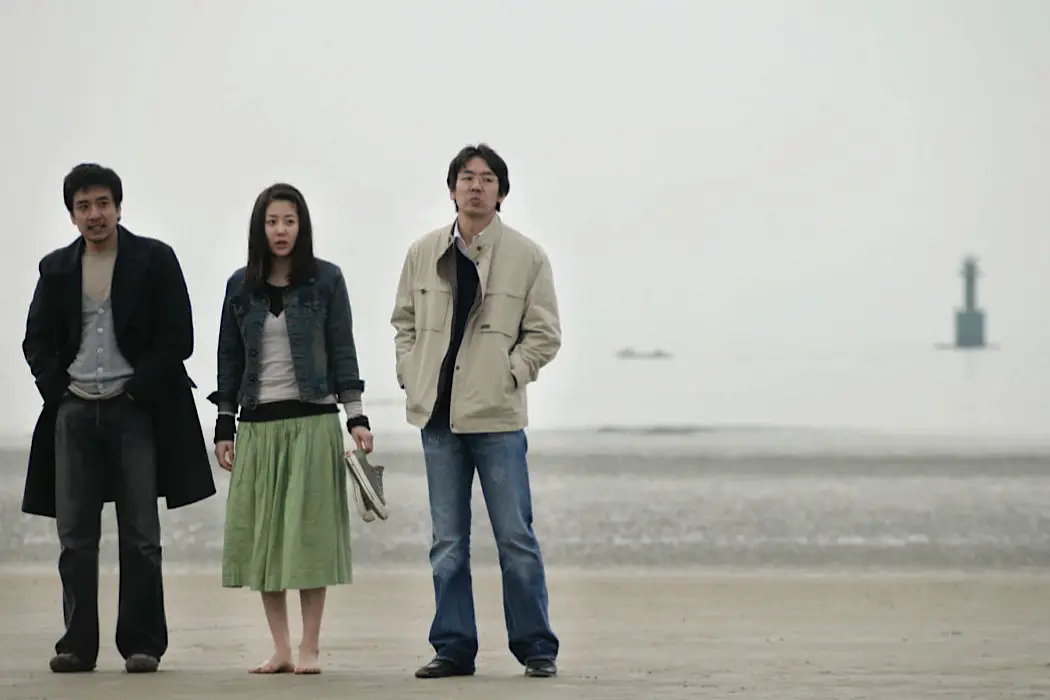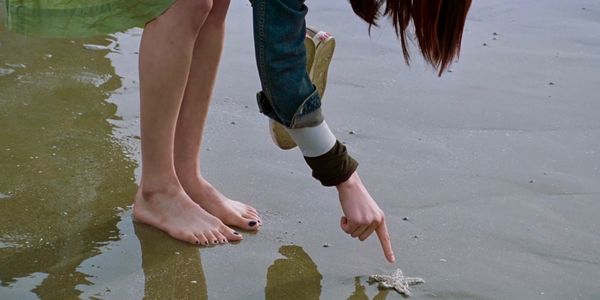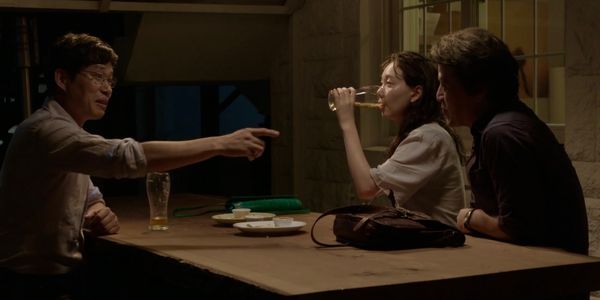Love Puzzles: 3 Films by Hong Sang-Soo

Soham Gadre is a writer/filmmaker in the Washington D.C. area.…
I had written about South Korean filmmaker Hong Sang-soo last year during the U.S. theatrical release of Grass and eventually included the movie in my Top 20 list for 2019, a year I consider one of the best for cinema in recent memory. I was eager to seek out more by him and this year, to my delight, three more of his movies have become widely available for the first time in the U.S. This is probably in no small part due to the coronavirus shutting down theaters and venues having to pivot to increased online streams of films, but also the success of Parasite at the Oscars, which opened the doors of consciousness for many Americans to South Korean cinema. The fact that an Oscar-victory was required for this is dubious, but that’s a discussion for another time. What’s really important right now is that these movies are available and while they have their flaws, they’re all certainly worth watching.
Woman on the Beach (2006)

I started this series of films chronologically as I am a believer in an artist developing, shifting, and changing ideas of their art and of themselves over time. Hong Sang-soo has been compared to Eric Rohmer many times in the past and his 2006 film Woman on the Beach, in a newly restored print which I streamed via Film at Lincoln Center’s Virtual Screening Room, is a perfect introductory piece to the filmmaker and what draws his comparison to Rohmer. It’s so perfect in fact that the movie not only shares themes, but also several shots, cuts, and a title with Rohmer’s 1983 relationship drama Pauline at the Beach.
Woman on the Beach revolves around a trip to the shore taken by a young couple, Kim Mun-suk (Go Hyun-jung) and Choi Sun-hee (Song Seon-mi), and Mun-suk’s filmmaker friend who is referred to in the film as “Director Kim” (Kim Seung-woo). As the movie progresses, Director Kim and Sun-hee develop a romance leaving Mun-suk in the dust. Both Rohmer’s and Hong’s films feature extensive romantic affairs and examine the ups and downs of relationships through love-making, fighting, and discussions of the human mind, but Hong’s approach aims for realism rather than being novelistic or cinematic. There isn’t much flair here other than Hong’s characteristic camera zooms, used both as a builder of dramatic tension (in the case of zoom in’s) and for comedic relief (zoom outs). The most meaningful conversations all happen in expected, familiar locations – a restaurant, the bedroom, in a car, walking on a street – and the simplicity of these moments belie the complexity of the dynamics happening at hand.
There are several moments in the movie that try to navigate the definition of a ‘relationship’ and it’s usually through cyclical conversations (many of them improvised by the actors themselves). It’s revealed a bit comically that Mun-suk and Sun-hee despite being ‘a couple’ have never had sex, and the latter uses this as a reason as to why she considers herself single. Mun-suk is a naïve and noble person and treats his relationship with Sun-hee much more seriously than she does, and despite the obvious knowledge that Director Kim is trying to inch in on Sun-hee, he doesn’t do much to confront it.
There is a dull air about the film that just didn’t grip me in any way. Much of the movie’s conversations and the central character arcs also wane in interest halfway through the movie. What Hong does do well, however, is allow his characters moral grey areas to play around in. He also has a much more analytical approach to romance and human relationships which are usually dispelled by characters explaining things in logical terms. There’s a scene where Kim uses a geometric diagram to illustrate to Sun-hee the thought process behind why people remain in denial in a relationship. This is a charming but manipulative use of ‘logic’ to explain away a moral problem. These and other moments are highlights that keep the film from completely losing inertia.
Woman on the Beach is like a scoop of vanilla ice cream, it’s not going to wow anybody, but it’s universally tolerable on a simplistic level. The flirting, awkward conversations about love, feelings of loneliness and abandonment, and the manipulations and lies that break relationships are basic rites of passage nearly everyone goes through. The events are laid out in a frustratingly cyclical manner in the film, which, to give credit to the realism Hong tries to instill, is only natural, but it doesn’t exactly make for exciting cinema.
Hill of Freedom (2014)

Logic puzzles are generally a crutch used by genre filmmakers to elevate their pulp to a more intellectual and symbolic experience. Christopher Nolan’s Memento is probably the most relevant example of this and Hill of Freedom can be considered in many ways as Hong Sang-soo’s own version of Memento. In the typical fashion of a realist however, Hong’s conceit isn’t about solving anything. The puzzle here is merely a mechanism to assist with the narrative – a woman named Kwon (Seo Young-hwa) drops a bunch of letters sent to her by a former admirer on the stairs and now must put them back together chronologically to track him down.
It’s an ingenious metaphor for how difficult it can be to reconnect with people from our past. The pieces over time become scattered, the memories incomplete, the familiarity washed away, and now they must be rejoined. Kwon’s correspondence is with Mori (Ryo Kase), a Japanese man who has recently returned to South Korea. He stays in a bed & breakfast and we are given a non-chronological recount through the letters collected by Kwon of Mori’s time in South Korea most of which is spent at a coffee shop called Jiyugaoka (“Hill of Freedom”).
As with Woman on the Beach, Mori’s conversations all happen in typical, familiar places where people may get together and gossip. Again, the examinations of love and relationships are round-about and Mori is this film’s Director Kim but just much more awkward and a fish-out-of-water. This movie felt more like something by Woody Allen than Eric Rohmer, and it’s in the way Mori conducts himself in the film, as both a knowledgeable and opinionated critic for the people he meets as well a naïve pontificator about himself.
He discusses philosophical concepts of love with a waitress named Young-sun (Moon So-ri) at Jiyugaoka who he ends up sleeping with and he struggles over what he hopes his future with Kwon may become, or even if she’ll accept him. Like Director Kim, Mori came across to me as pseudo-intellectual and his strange self-assured nature which may be a projection by Hong of himself left me a little nonplussed. The embarrassing awkwardness of his conversations with Korean locals, which obviously have a dark cloud of imperialist history hanging over all of them, are honestly difficult to sit through. Much of Hong’s style remains unchanged with conscious camerawork meant to function as an indicator of where the drama is rising and falling, and also an indicator of what is being left off the screen. What Hill of Freedom ends up being is a mixed bag of well-developed techniques and good ideas undone by a thoroughly off-putting central character.
Yourself and Yours (2016)

I found Yourself and Yours to be much more thematically developed and interesting than the previous films in this series while still not quite on my direct wavelength as Grass which I still consider Hong’s best film (I haven’t yet seen his most celebrated work Right Now, Wrong Then). The main reason why this one struck more of a chord that it treats love as something surreal and impenetrable, which is to say that it’s a concept that influences people into irrational decision-making and bends everything to its mercy. Once Mijung (Lee Yoo-young) announces during a domestic argument that she and boyfriend Youngsoo (Kim Joo-hyuk) should take a break, Youngsoo spends the rest of the movie hopelessly aching over the absence of his girlfriend. Minjung meanwhile – or at least, someone who resembles Minjung – dates multiple other men.
The identity of Minjung is what makes the movie’s theory on love work because it really throws a loop into our expectations of a relationship drama. There are several instances where Minjung re-introduces herself as a different person to different men she happens to meet at a bar where she drinks heavily nearly every day. All of a sudden, like Youngsoo, we start to lose a sense of place and time in the film, and we’re left constantly guessing whose words and actions are unreliable. The movie’s location jumps and hard cuts to black also give a sense of alternate realities and timelines. Hong is adept at turning relationship dramas into puzzles and this one is more theoretical than logical, and by that virtue, more fun.
Youngsoo, a hopeless romantic, continually confesses to people that he is deeply in love with Minjung – to the point where one of his female friends call him, and all men, pathetic – but the Minjung that he is in love with is only part of a whole person. The two other men who “she” dates also are caught in a web of unreliable narration when Minjung later on in the film insists she’s never seen them before. Yourself and Yours work depending on whether or not you buy into its playful metaphors. For me, Minjung as a metaphorical representation of a ‘fixation’ that men have on a woman who becomes their singular object of desire, is Hong’s most relatable observation of love.
Woman on the Beach, Hill of Freedom, and Yourself and Yours are streaming as part of the Hong Sang-soo retrospective at Film at Lincoln Center’s Virtual Cinema
Does content like this matter to you?
Become a Member and support film journalism. Unlock access to all of Film Inquiry`s great articles. Join a community of like-minded readers who are passionate about cinema - get access to our private members Network, give back to independent filmmakers, and more.
Soham Gadre is a writer/filmmaker in the Washington D.C. area. He has written for Hyperallergic, MUBI Notebook, Popula, Vague Visages, and Bustle among others. He also works full-time for an environmental non-profit and is a screener for the Environmental Film Festival. Outside of film, he is a Chicago Bulls fan and frequenter of gastropubs.













